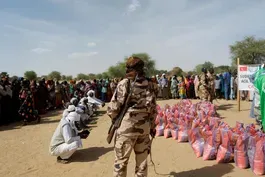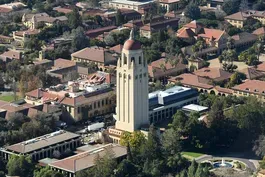
Heat waves break records and disrupt life across world
Clip: 7/20/2023 | 9m 23sVideo has Closed Captions
Punishing heat waves break records and disrupt life across much of the world
The record heat across the world has been unrelenting and the World Meteorological Organization says it could last into August. The extreme weather is not limited to the heat, there is also torrential rain in some places. Special correspondents in four major cities across the world sent us these reports.
Problems with Closed Captions? Closed Captioning Feedback
Problems with Closed Captions? Closed Captioning Feedback
Major corporate funding for the PBS News Hour is provided by BDO, BNSF, Consumer Cellular, American Cruise Lines, and Raymond James. Funding for the PBS NewsHour Weekend is provided by...

Heat waves break records and disrupt life across world
Clip: 7/20/2023 | 9m 23sVideo has Closed Captions
The record heat across the world has been unrelenting and the World Meteorological Organization says it could last into August. The extreme weather is not limited to the heat, there is also torrential rain in some places. Special correspondents in four major cities across the world sent us these reports.
Problems with Closed Captions? Closed Captioning Feedback
How to Watch PBS News Hour
PBS News Hour is available to stream on pbs.org and the free PBS App, available on iPhone, Apple TV, Android TV, Android smartphones, Amazon Fire TV, Amazon Fire Tablet, Roku, Samsung Smart TV, and Vizio.
Providing Support for PBS.org
Learn Moreabout PBS online sponsorshipGEOFF BENNETT: The record heat across the world has been unrelenting, and experts say it could last into August.
And it's not only the heat.
It's torrential rain in some places.
A mudslide in Northwest India today killed at least 10 people with many more missing.
Special correspondents in four major cities across the world sent us these reports starting in Southern Europe.
GILES GIBSON: I'm Giles Gibson in Rome, which is known as the Eternal City, but it's now been dubbed the Infernal City.
Temperatures this week have soared over 107 degrees, setting a new record for the Italian capital.
We have come down to the Coliseum to ask some tourists if it's possible to enjoy sightseeing in this oppressive heat.
ANTHONY, American Tourist: No.
This is the last place I wanted to be.
(LAUGHTER) FRANCIS, Canadian Tourist: I mean, it's kind of hot, but the city is beautiful.
So you just need to stay hydrated, a little bit of water, a little bit of spritz.
And, I mean, you have made the best out of it.
JOE SCOTT, American Tourist: Some of the tourist attractions here have cold water for you, where you could just refill your bottles.
So we have been able to refill our bottles and keep drinking water.
So we're still enjoying it.
We're still getting to see all the sights and enjoying it.
GILES GIBSON: The authorities are urging local residents and tourists to stay indoors during the hottest part of the day.
But not everybody is listening.
PIERO PELLICCIONI, Rome Civil Prosecution Department (through translator): They're hearing us without a doubt.
Nonetheless, they're still going around Rome like they're used to, in the way that they're used to, with shorts, flip-flops and tank tops.
We're giving out water so they can cool down a little bit.
Are they following the advice?
Not really.
However, let's say that, in principle, they're informed about how they should behave in this kind of weather.
GILES GIBSON: Hot summers and nothing new here in the Italian capital.
Since the 1870s, locals have been using these traditional water fountains known as nasoni to cool down if they're out and about on a hot day.
What is new, however, is the intensity of this heat wave.
And it's set to drag on into next week.
SIMONA FOLTYN: I'm Simona Foltyn in Baghdad, where the Iraqi capital is broiling in 116-degree heat.
And for the city's poor, there are few ways to escape.
These young men traveled from nearby slums to cool off in the Tigris River.
"There is no electricity.
The heat is killing us," 18-year-old Yasser tells me.
But, soon, there may be nowhere at all to seek respite.
Iraq's rivers, on whose banks Mesopotamia civilizations emerged 8,000 years ago, are slowly disappearing.
Fisherman Hashem Al-Musawi has been alive for 76 years.
He tells me he has never seen water levels this low.
And he's right, according to the minister of water resources.
This year is the worst drought since the first recording of hydrological data in 1930.
HASHEM AL-MUSAWI, Fisherman (through translator): Before, the water used to go all the way up to the houses.
Even the army would come and bring sandbags to keep it from flooding the houses.
There was so much water.
Now things have changed.
SIMONA FOLTYN: Changes caused by an existential struggle over water with Turkey and Iran.
Both have dammed the Tigris and Euphrates and their tributaries further upstream.
Lack of rainfall and poor water management have made matters worse.
The impact has been devastating.
HASHEM AL-MUSAWI (through translator): We don't have agriculture anymore, and the fish are dying because there's not enough oxygen in the water.
SIMONA FOLTYN: While the water recedes, demand for it rises, as Iraq's rapidly growing population tries to survive in this increasingly inhospitable environment.
FIRAQ ABBAS, Baghdad Resident (through translator): I wash the street because there's so much dust when the cars pass by.
When they sprinkle the street with water, the air becomes better.
SIMONA FOLTYN: Mostly Iraqis only get a few hours of government electricity per day to run air conditioners and can't afford to pay for private generators.
In addition to the sweltering heat, Iraqis are struggling to cope with widespread electricity outages, as well as a severe water crisis.
But even as the situation becomes increasingly untenable, the government is doing very little about it.
There is no climate adaptation strategy, and less than a half-percent of this year's budget has been allocated towards much-needed investments in water infrastructure.
Iraq is an oil-rich nation whose potential has been crippled by conflict and rampant corruption.
Many Iraqis no longer see a future in what was once the cradle of civilization.
Leaving may eventually be the only way to survive.
NEHA POONIA: I'm Neha Poonia in New Delhi.
Now, just last week, all that you see behind me was a thriving urban slum home to about 5,000 people.
Now you can barely see the homes and the farms that stood here.
For the last two weeks, much of India's capital city has been waterlogged and its low-lying areas completely inundated.
It's the worst flooding that Delhi has seen in more than five decades, and experts are blaming climate change.
This month, Delhi received 110 percent more rainfall than it usually does, shattering a 45-year record.
The incessant rainfall led to the city's Yamuna River to breach its banks when it surged past what authorities called the danger mark.
The Indian army and the national disaster response force used boats to pull people to safety.
Authorities say many didn't want to leave their homes, staying perched on their roofs for days; 25,000 people were evacuated, and most of them are now living in hastily assembled makeshift shelters along roads like this one.
This is usually one of Delhi's busiest junctions, but it's now been shut down for regular traffic.
While the incessant rainfall has finally stopped, it will be a while until these people are able to return home.
Officials are warning of waterborne diseases and dengue, so the danger isn't over yet.
MOHAN LAL, Farmer (through translator): I'm scared of going back to my house because more rain is forecast soon.
I'd rather live on the road until it is completely safe to return the value.
MAN (through translator): I have been living in Delhi for 10 years.
I have never seen rain and flooding like this.
NEHA POONIA: Climate change has made the monsoon more erratic and far more devastating.
It's also making heat waves longer and deadlier.
Just last month, some parts of the country saw temperatures touch 115 degrees Fahrenheit, leading to more than 170 deaths.
Studies have shown that India is among those countries most impacted by climate change.
And doctors are warning that such extreme weather events are already pushing millions of Indians to the very brink of human survival.
REBECCA BUNDHUN: I'm Rebecca Bundhun in Tokyo.
The region has been affected by a series of extreme weather events this month, from deadly floods and powerful typhoons to sweltering heat waves.
Here in Japan, the country has been experiencing varying forms of severe weather.
While northeastern and western parts of the country were lashed by torrential rains, causing flooding and landslides and claiming lives, heatstroke warnings were being issued in Tokyo and other areas as temperatures neared record highs.
Neighboring South Korea meanwhile, was battered by heavy rain over the weekend.
Flooding and landslides, which swept away entire homes, killed more than 40 people.
In one incident, the rain flooded a tunnel in the central city of Chungju.
Commuters were left trapped in their vehicles; 14 people died.
This prompted the country's president, Yoon Suk-yeol, to call for an overhaul of the country's response system to be able to better manage the impact of climate-induced disasters.
Over in China, temperatures are hitting record-breaking levels in some areas.
State media reported that a remote township in the northwest experienced heat of more than 126 degrees Fahrenheit.
Just six months ago, temperatures plunged to record lows of minus-63 degrees in the north.
And, this week, a typhoon struck, causing widespread flooding in China's southern provinces.
Such weather conditions are leading to thousands of people being displaced and evacuated.
Japan has one of the oldest populations in the world.
Nearly 30 percent of its citizens are over the age of 65.
And that makes it more vulnerable to heat.
Not only do these weather conditions impact human lives.
They also have economic consequences.
And people are worried.
MAN (through translator): The weather changes are scarier than a war.
UEHARA ZENKICHI, Student (through translator): There's nothing we can do about nature.
But when there's heavy rain, I wish there wasn't and hope everyone is safe.
REBECCA BUNDHUN: With extreme weather events becoming more frequent in the region, concerns are mounting over how countries will cope with such conditions over the coming weeks and years.
For the "PBS NewsHour," with Giles Gibson in Rome, Simona Foltyn in Baghdad, and Neha Poonia in New Delhi, I'm Rebecca Bundhun in Tokyo.
Millions flee homes in Sudan amid reports of war crimes
Video has Closed Captions
Millions flee homes in Sudan amid reports of widespread war crimes (6m 21s)
RFK Jr. comments spreading misinformation draw scrutiny
Video has Closed Captions
RFK Jr. appears before Congress as his comments spreading misinformation draw scrutiny (10m 43s)
Stanford president resigns after report on flawed research
Video has Closed Captions
Student journalist discusses reporting that led to Stanford president's resignation (5m 24s)
Texas women testify in lawsuit against abortion restrictions
Video has Closed Captions
Texas women testify in lawsuit claiming abortion restrictions put their lives in jeopardy (7m 15s)
Why ACL injuries are more common in female athletes
Video has Closed Captions
Why ACL injuries are more common in female athletes than male counterparts (8m 8s)
Providing Support for PBS.org
Learn Moreabout PBS online sponsorshipSupport for PBS provided by:
Major corporate funding for the PBS News Hour is provided by BDO, BNSF, Consumer Cellular, American Cruise Lines, and Raymond James. Funding for the PBS NewsHour Weekend is provided by...
















